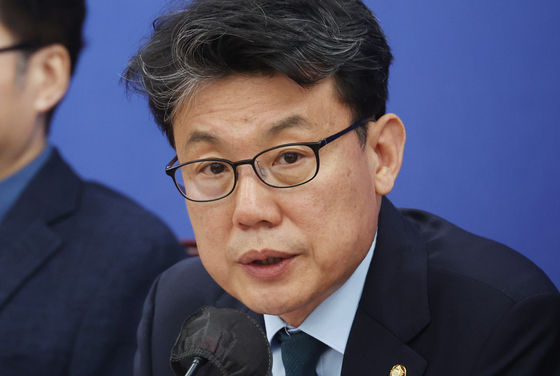
Jin Sung-joon, the chairman of the Democratic Party’s policy committee, stated that selective distribution could also be considered in relation to the ‘livelihood recovery support fund’ that gives 25,000 won per person. (Photo=Yonhap News)
The Democratic Party revealed that selective distribution could also be considered in relation to the ‘livelihood recovery support fund’ that gives 25,000 won per person.
Jin Sung-joon, the chairman of the Democratic Party’s policy committee, stated in an interview on MBC Radio’s ‘Kim Jong-bae’s Focus’ today (14th), “The government has no intention of providing the livelihood recovery support fund, but there is discussion within the ruling party about providing it selectively,” and said, “This issue should also be considered together.”
Jin said, “It is the position of our party to provide it universally to all citizens. We believe that this will maximize the economic effect of the livelihood recovery support fund,” and explained, “If the government and ruling party suggest focusing on difficult individuals based on household income or asset status, it is also worth considering.”
He added, “Since the government has to budget and provide the funds anyway, there is willingness to fully consider the government and ruling party’s position.”
The Democratic Party plans to promote the payment of the livelihood recovery support fund as the first bill of the 22nd National Assembly.
If the government maintains a negative position on additional supplementary budget allocation citing tax revenue shortages, the plan is to promote a ‘special measure law’ that can immediately execute the livelihood recovery support fund through specific administrative targets, timing, and methods contained in the bill.
Jin said, “We are currently preparing the bill,” and said, “We are thinking of holding a workshop for elected members at the end of this month, and if the consensus is gathered at that meeting, we think we can submit the bill as soon as the 22nd National Assembly opens.”
The plan is to provide 25,000 won per person in local currency.
Regarding concerns about the possibility of unconstitutionality of the special measure law, Jin stated, “A special measure law is a law that directly creates rights or obligations for citizens without going through administrative execution or trials,” and said, “Not all special measure laws are unconstitutional.”
Jin said, “In the past, there have been many cases where lawsuits against the unconstitutionality of special measure laws have been raised, and the Constitutional Court has ruled that if the public interest is clear, it is not unconstitutional,” and pointed out that arguing that all special measure laws are unconstitutional is a logical leap.”
Previously, Deputy Prime Minister and Minister of Planning and Finance Choi Sang-mok mentioned that there is a strong opinion among experts that the Democratic Party’s promotion of the livelihood recovery support fund through a special measure law has a high risk of unconstitutionality because the Constitution clearly specifies that the budgeting authority is in the hands of the administration.

